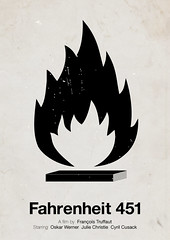After posting my annotated bibliography on my initial research into censorship I kept thinking about part of the story I didn't share. So in a spare moment today I looked further into the idea and this is what I found. (yes these are all online resources, but that's what you get for asking a child of the digital age!)
The Story (Part 2):
So as I was researching and flipping through books about censorship I kept thinking about a book that I had read in the 9th grade, which I was told had a central theme of censorship, Fahrenheit 451. To be sure I had the right book I checked in out on Wikipedia, where I found this:
At the very least someone should tell Spark Notes.
What do you think?
The Story (Part 2):
So as I was researching and flipping through books about censorship I kept thinking about a book that I had read in the 9th grade, which I was told had a central theme of censorship, Fahrenheit 451. To be sure I had the right book I checked in out on Wikipedia, where I found this:
" Bradbury has stated that the novel is not about censorship, but a story about how television destroys interest in reading literature, which leads to a perception of knowledge as being composed of factoids, partial information devoid of context."Interesting right? Well not one to take Wikipedia at face value I checked out their two sources. It turns out that when Bradbury won the Pulitzer Prize in 2007, he talked to a report for the LA Times and gave this story. In the article this is said,
"Now, Bradbury has decided to make news about the writing of his iconographic work and what he really meant. Fahrenheit 451 is not, he says firmly, a story about government censorship. Nor was it a response to Senator Joseph McCarthy, whose investigations had already instilled fear and stifled the creativity of thousands.
This, despite the fact that reviews, critiques and essays over the decades say that is precisely what it is all about. Even Bradbury’s authorized biographer, Sam Weller, in The Bradbury Chronicles, refers to Fahrenheit 451 as a book about censorship.
Bradbury, a man living in the creative and industrial center of reality TV and one-hour dramas, says it is, in fact, a story about how television destroys interest in reading literature."If you don't believe the internet there is an accompanying video found here. (Take that Library!)
At the very least someone should tell Spark Notes.
What do you think?

No comments:
Post a Comment